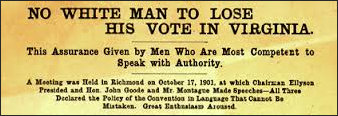
1901 constitution flyer
by Donald J. Rippert
The Commonwealth’s Cornucopia of Constitutions. Virginia has written, scrapped and rewritten its state constitution many times. Virginia is presently operating under its seventh constitution. While that seems striking compared to the U.S. Constitution, it’s not that unusual for a state constitution. Florida and Pennsylvania have had five constitutions, South Carolina six, Georgia nine and Louisiana a whopping eleven different constitutions. Of the original 13 colonies only Massachusetts has yet to perform a constitutional rewrite.
The Spirit of ’76. Virginia’s first constitution was written in 1776. George Mason and James Madison are seen as primary authors. After the obligatory heckling of King George III the constitution got down to the basics of defining the state government – bicameral legislature, governor and so on. The accompanying Virginia Declaration of Rights was a strong point of this first constitution. That document would effectively become the predecessor to the U.S. Bill of Rights. Unfortunately, elitism has been a constant companion to Virginia politics and this constitution was no exception. Voting was reserved for owners of substantial property and men of wealth. The landowners of Southeastern Virginia would be in control of the state.
East vs West – 1830. By the 1820s Virginia was (predictably) one of only two states that restricted voting to landowners. The state constitutional convention of 1829 to 1830 tried to address this distorted concentration of power in the landed gentry. Suffrage requirements were reduced but not enough to address the concerns of the small farmers in the western parts of the state. Virginia kicked the can down the road.
The Reform Constitution, 1851. As the population of western Virginia continued to grow, the Richmond-to-Norfolk “corridor of evil” vainly tried to maintain control of the state through voting rights that required substantial property ownership and a bizarre county-based representation system. Talk from the west of abolishing slavery and / or secession from the state forced the eastern elites to change. The new constitution gave the vote to all white men of voting age and called for election of the governor, the lieutenant governor and all judges by popular vote.
Wartime Constitution, 1864. After years of political abuse by Virginia’s southeastern elite, a number of the counties in the western and northern part of the state decided they would not follow the Richmond-centric rebels into what can only be called an apocalyptic Civil War. The Constitution of 1864 could effectively be called the first state constitution for West Virginia. What remained of Virginia was too busy marching toward utter destruction and unconditional surrender to bother with constitutional niceties.
The Carpetbagger Constitution, 1870. The provisions of The South’s surrender included military occupation of states like Virginia. Given that slavery had been abolished the military commander of Virginia called for a constitutional convention to memorialize America’s new reality. However, the Richmond-based elite would have none of it. Many of the white conservative Virginians who developed the bright idea of a failed secession from the United States now refused to vote for delegates to the constitutional convention. This led the way for a Republican led convention headed by John C. Underwood. In what should come as a surprise to nobody, the “elite free” convention wrote one of Virginia’s best constitutions. The new constitution granted suffrage to all males over 21, established a public school system with mandatory funding and ended the disenfranchisement of former Confederate government members.
The Empire Strikes Back, 1902. Virginia’s short period of competent government was ended as the Democratic Party retook the state legislature. The usual band of elitists called for another constitution to be written. It was a doozy. Poll taxes and literacy tests were included to effectively remove African Americans from the voting booth. Segregation became the law of the land. Power was aggrandized in Richmond with the elimination of the county court system. The State Corporation Commission gave added weight to the centralized government. Since African Americans still could vote based on the 1870 Constitution The Imperial Clown Show in Richmond decided to pass this abomination without a popular vote. This was both Virginia’s worst constitution and its longest-lived.
Do we have to? 1971. While Virginia’s political elite moved smoothly from poll taxes to literacy tests to segregation to massive resistance, the rest of the country progressed. Mounting federal pressure in the form of U.S. Supreme Court decisions like Brown v. Board of Education and legislation like the Voting Rights Act of 1965 made it harder and harder for Virginia’s elite to persecute a large percentage of Virginia’s population. A new constitution was needed. The most heinous racist provisions of the 1901 Constitution were removed and Governor Mills Goodwin managed to convince the delegates to drop the “pay go” policy that had infected prior constitutions. However, the aggrandizement of power in Richmond generally and the General Assembly in particular remained.
The history of Virginia’s constitutions has been the story of a small elite eschewing true democracy in a sad effort to keep the lives of many under the thumbs of a few. To date, progress in Virginia has only come from the barrel of a gun (1870) or the threat of federal action (1971). The present state constitution continues to thwart democracy albeit more subtly than was the case with the 1902 travesty.
In the next section of this series the many flaws of Virginia’s existing constitution will be examined.


